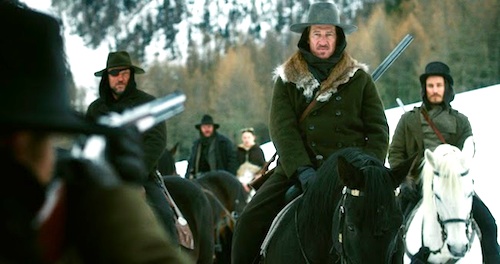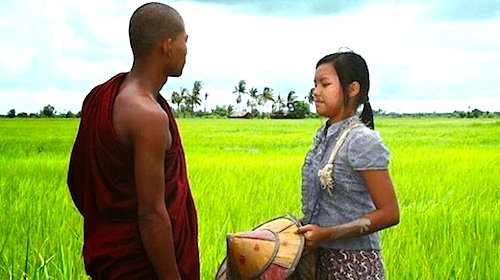By Joe Bendel. Old European feudalism is about to get a taste of revenge, served up in vintage American Western style. A stranger has come to a remote town high in the Austrian Alps and that means what it always does. Someone will pay for something in Andreas Prochaska’s Dark Valley, which releases on DVD this week from Film Movement.
Greider is an American, but he learned fluent German from his mother. He has come to the inhospitable town with his daguerreotype camera and an equalizer. He would have the locals believe he is an early forerunner of Ansel Adams, there to photograph nature, but they are not buying it. Nonetheless, he finds lodging with the reluctant Luzi and her widowed mother for the winter (which will be long, everyone ominously assures him). The entitled Brenner sons quickly key in on Greider as a target for their bullying. However, he also seems to take an interest in them, asking questions like “if someone were to start killing old Brenner’s sons, how busy would they be?”
Soon, a couple of Brenners turn up dead and Greider is not exactly disavowing responsibility. It turns out Brenner and his sons enforce the old feudal custom granting them wedding night privileges with all brides in the valley. That is why Luzi’s impending nuptials with the earnest but mild-mannered Lukas are more of a source of angst than joy, despite their mutual love for each other. Greider is familiar with the tradition and he has had enough of it.
So evidently you have to go to Austria to get a credible western these days. In fact, Austria selected Valley as its official foreign language Oscar submission, but it did not make the shortlist cut. Prochaska definitely understands the genre conventions, even though he realizes them in an austerely chilly, Teutonic style. Frankly, he executes a darned good shoot-out down the stretch, while capitalizing on the awesome Alpine backdrops (shot with fittingly dark majesty by cinematographer Thomas Kiennast).

Sam Riley hardly looks like a killing machine, but his pale clamminess works well in context, nonetheless. Evidently, the crew referred to him as “Pale Greider” during shooting, in reference to the Eastwood film, which is not wholly inappropriate. Valley has a similar vibe to Eastwood’s later, slightly revisionist westerns. Regardless, the Brenners still need killing and when Greider obliges it is pretty satisfying.
Even though she is stuck with some plodding narration, Paula Beer is relatively forceful and dynamic as Luizi. Let’s be honest, this is not exactly the sort of premise that is conducive to strong female characters, but she does rather well given the circumstances. On the other hand, Tobias Moretti really cuts loose with the moustache-twisting villainy as the elder Brenner Brother, Hans.
Frankly, the Austrian Alps make a nice change of pace from Monument Valley. It is also good to see some life left in the western genre. Anyone who enjoys a rugged revenge tale should appreciate Prochaska’s Strudel Western. Highly recommended, Dark Valley launches on DVD today, from Film Movement.
LFM GRADE: B+
Posted on January 8th, 2014 at 9:42pm.
